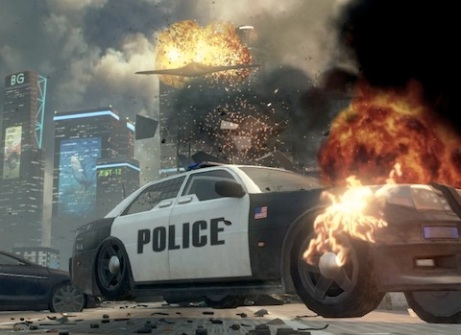As videogame rhetoric continues its intellectual promiscuity, many of the culture’s pettiest affects persist inside the husk of objective-seeming argument. There is special and hypocritical nastiness given to war shooters like Call of Duty, which many categorize as a sub-genre of “dudebro” adventurism, stories told about men so masculine their gender needs repeating. I too have indulged in this loose and prejudicial stereotyping, subheading a criticism of Gears of War 2 as “The Broman cometh.” I hoped the contrast of lowbrow social stereotype with a callback to early 20th Century melodrama would capture the tonal disparity of that game, serious as a sandbag in one scene, and thoughtlessly savage in another. But these words have become so imbued with negative social coding that, like the empty signifiers of hippy, douche, hipster, and nerd, they mean nothing now, vessels meant only to carry aggression, directed toward a demographic that the writer presumes most of her readers will dislike.
As I have attended midnight launches of Call of Duty games for the last three years, it’s become apparent that a huge percentage of the player population are not dudebro’s, monsters of class privilege sent off to an expensive college for a four year-education in hazing, binge drinking, and date raping before ascending to careers in marketing, engineering, and investment banking. Most of the men–and it is almost exclusively men–who gather in the middle of the night to buy these games as soon as possible, are young and poor, mostly uneducated, late teens or early twenty year-olds, children of the working poor in the early stages of repeating the lifecycle of their parents, pushed into low-paying jobs without benefits, a status which subconsciously transforms them from a human kid into a socio-political stereotype. There is a demographic who understand that domination through implied and expressed violence is the basis of our social structure, a fact that usually guarantees a fraternity kid can drink their way to a Bachelor’s Degree and a job while another kind of kid gets flunked out of school and winds up trying to support himself and maybe a child and girlfriend on 25 hours a week working at Best Buy or Wal-Mart. Violent shooters can be seen not just as cheap adrenaline rushes for the spawn of upper middleclass luxury, but as a fantasy relief for the people whose labor and disenfranchisement makes that separatist privilege possible.
When I wrote about Call of Duty: Black Ops II last year I wanted to include some experience of my night buying the game at midnight in New York, but my editor cut the section, claiming I was investing “arbitrary meaning” in the “vision of socially stunted, aggressive dudes playing violent videogames.” It seemed to me like he was transposing “socially stunted” into the place of “exploited and long suffering,” warding off the effects of a creative work he didn’t like by derogating a social group he felt was most associated with it. In comparison, this deleted section is self-consciously sentimental, romantic in its political affectation, excusatory, turning anecdotal assumptions into broadsweeping social connections. But it’s something I think about whenever I hear another thoughtful-seeming game writer turn “bro” into a sarcastic fulcrum of ridicule for anyone who finds meaning in a kind of game they can’t. I have no special claim to the full truth of these games nor their players, but here’s a vision of one side of it that I’ve experienced, standing in line with these boys and men that everyone else seems to disdain.
To wit:
“It is the same crowd every year, young men with hard faces, nervously shifting their feet, avoiding eye contact, wearing hoodies over work uniforms. When someone has to ask which line is for which version of the game, it’s a hard blast of language, confrontational confidence masking the fear of not knowing already what everyone else seems to. I remember these postures and customs by instinct. I know the humiliation of never having money, and the way being surrounded by expensive things in a store makes one feel like a foreigner. I remember the total loss of hope I had the first time a cop put a pair of handcuffs on me at 23. I like these people. I recognize the mistrust, the anxiousness, the shame, the false swagger. No one here is nice, we fear the worst from one another. And I realize when I walk out of the store with my game that I am always leaving them here, in the middle of the night, each of us returning home to sit alone in the relief of these angry little dreams, a hell we have inherited, where survival is possible only if we continue to follow the orders given by people whose holstered guns guarantee they never have to be wrong about anything.”

This is an incredibly thoughtful piece. I’m glad Critical Distance linked me to it, and I’m appreciative of your journalism. Thank you.
Pretty good food-for-thought. I’ll be sure to mention this next time I hear someone group guys in a lazy stereotype.
This being the first article I read from you, it looks like I’ll have quite the binge-reading to do. Looking forward to it. 🙂
How does one get out of these places? Out of living in a hyper-masculine hell-hole?
Can I just say what a relief to discover someone who in fact knows exactly what theyre speaking about on the internet. You need to know how to deliver an issue in order to light making it important. More people should read this and understand this part of the story. I find it difficult to believe youre not more popular as you definitely possess the gift.